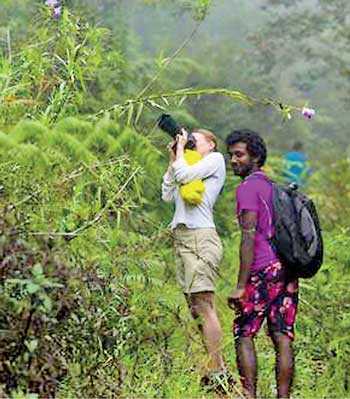Sunday Feb 22, 2026
Sunday Feb 22, 2026
Friday, 29 June 2018 00:00 - - {{hitsCtrl.values.hits}}
 By Meera Srinivasan
By Meera Srinivasan
The Hindu: Sri Lanka is aiming for a tourism revenue of $4 billion this year, which would be a record high for the sector. To achieve that, the island’s tourism department will chiefly target visitors from India, from where it gets the highest number of visitors. Authorities point to an uptick in young travellers from India coming to Sri Lanka on weekend trips. They arrive on Friday night and return on Sunday, often squeezing in a quick drive to beach towns such as Galle and Bentota along the southern coast.
With the hope of getting Indian tourists to prolong their stay, and to draw more tourists from other key markets such as China, the United Kingdom, Germany and France, Sri Lanka’s Tourism Development Authority is looking to popularise new attractions. According to its chairman Kavan Ratnayaka, these places will also be an alternative to the currently popular destinations that often get overcrowded — especially Yala National Park in the south and the ancient rock fortress of Sigiriya in the Central Province. “We are exploring if the ancient town of Polonnaruwa can be presented as an alternative to Sigiriya, and other national parks like Minneriya and Kaudulla as alternatives to Yala,” he told The Hindu.
Additionally, tourism authorities are giving shape to the ‘Ramayana trail’, which will consist of sites that many believe have links to the epic. While private tour operators already offer packages to some of these sites, the Tourism Development Authority is yet to formalise the trail. New Delhi, especially after the Bharatiya Janata Party (BJP) government took over in 2014, has been reportedly keen on the initiative. Simultaneously, within Sri Lanka, there is a resurgent interest in Ravana that offers potential for developing associated sites, officials said.
Making Colombo more happening
The trail is only one of the many attractions on the scenic island, where the beaches, hills and historic sites compete for attention. Many Indians are also patrons of the 24-hour casinos in Colombo. In fact, some of them travel frequently, often in groups, and spend the weekend chasing fortunes. The Sri Lanka Tourism Development Authority is also focussing on “making Colombo more happening” with greater retail and entertainment options, authorities said. While its outreach is global, there is a special focus on India – for its proximity and traditional business links – through a targeted campaign online.
Since the end of the civil war in 2009, Sri Lanka has been witnessing a steady increase in tourist arrivals, but there has been a considerable surge in the last couple of years. From 4.47 lakh in 2009, the number of tourists increased to 10 lakh in 2012. By 2016, the figure had doubled to 20 lakh, according to official data. This year, until May, over 10 lakh tourists visited the island. Of those, about 1.7 lakh visitors, almost a fifth of the total arrivals, were from India. China came second in terms of the number of tourists, with 1.16 lakh arrivals.
Tourism is, at present, Sri Lanka’s third-biggest source of foreign exchange, after tea and textiles. Authorities want to push it to the top slot. Keeping this objective in mind, they have strengthened security measures. Earlier this year, following a series of incidents involving sexual abuse and violence targeting foreign tourists, authorities said they would set up police posts and patrols at popular resorts. “We have zero tolerance to any threat to the safety of tourists. Sri Lanka should be absolutely safe for the solo woman traveller. That is the standard we are working towards,” said Ratnayaka.
(The writer works for
The Hindu and is based
in Colombo.)